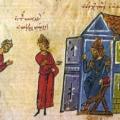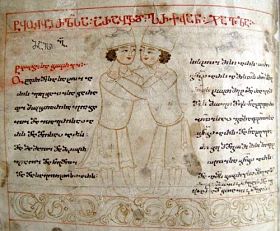319. Georgia on My Mind: Petritsi and the Proclus Revival
The Neoplatonist Proclus gets mixed reviews from Christians, as Nicholas of Methone refutes him but the Georgian philosopher Ioane Petritsi helps to revive his thought.
Themes:
• L. Alexidze (trans.), Ioane Petrizi: Kommentar zur Elementatio theologica des Proklos (Amsterdam: 2009).
---
• P. Adamson and F. Karfik, “Proclus’ Legacy,” in All From One: a Guide to Proclus, ed. P. d’Hoine and M. Martijn (Oxford: 2016), 290-321.
• L. Alexidze, “The Supreme One: Its Transcendence and its ‘Kataphatic’ Characteristics in Ioane Petritsi’s Philosophy,” Bochumer philosophisches Jahrbuch für Antike und Mittelalter 20 (2017), 63-86.
• D. Calma (ed.), Reading Proclus and the Book of Causes, vol.2 (Leiden: 2021).
• S. Gersh (ed.), Interpreting Proclus: from Antiquity to the Renaissance (Cambridge: 2014).
• L. Gigineishvili, The Platonic Theology of Ioane Petrisi (Piscataway: 2007).
• S. Mariev (ed.), Byzantine Perspectives on Neoplatonism (Berlin: 2017).
• G. Podskalsky, “Nicholas von Methone und die Proklos-Renaissance in Byzanz,” Orientalia Christiana Periodica 42 (1976), 509-23.
• J.M. Robinson, “Dionysius against Proclus: the Apophatic Critique of Nicholas of Methone’s Refutation of the Elements of Theology,” in D.D. Butorac and D.A. Layne (eds), Proclus and his Legacy (Berlin: 2017), 249-69.
Stanford Encyclopedia: Joane Petrizi
My thanks to Joshua Robinson and Lela Alexidze for their help with this episode!







Comments
Aristotelian Theory of Concepts
Let me first express my appreciation for your efforts in preparing and presenting this excellent series--thank you! I have a question about a point you made in this episode (319). You said:
"Here [Nicholas of Methone] is appealing to what had become the standard view of universals within Aristotelianism, according to which general concepts are just that: concepts in the mind, rather than objectively existing things."
I believe this also represents Aristotle's own view. The scholastics, however, interpreted him as a moderate-realist, claiming that all members of a class contain some common element--basically relocating Plato's Forms from an Ideal Realm to this-wordly particulars.
I am very interested in this aspect of Aristotle's thought, what he may have actually believed, how various Aristotelians and commentators interpreted him, and how those interpretations developed historically. Can you recommend any material that discusses this specific issue and its history in greater detail? Specifically, what led the Aristotelians of Nicholas' time to interpret Aristotle differently than the scholastics (if indeed you believe there is a difference)?
Thanks again for your remarkable work.
In reply to Aristotelian Theory of Concepts by Chuck Butler
Conceptualism
Thanks, glad you like the series! I think I had better refer you to the various episodes on Latin medieval philosophy where this is discussed - if you go to the link below for "Themes" and then to the theme on universals and just listen to the episodes from the medieval series you will get lots of stuff that answers your question. Note also the further reading on those episodes which you could follow up. But just briefly, I would not agree with your general characterization of the Latin scholastics. In the 14th c. especially, anti-realism is taken to be just obviously true and also to be Aristotle's position, with the exception of realists like Burley and later on Wyclif. (Also those who are more realist - maybe you are thinking of Aquinas - would strenuously deny that they are accepting anything like a Platonic Form theory.) The conceptualist position emerged already in antiquity in Neoplatonic commentators on Aristotle, and is also the prevalent view among Aristotelians of the Islamic world, most notably Avicenna. So when we find conceptualism in the Byzantines this is just par for the course and shows a conceptualist interpretation from late antiquity finding its way into all three medieval cultures.
In reply to Conceptualism by Peter Adamson
Themes
Ah--thank you, Professor--the Themes link is very helpful indeed! Hadn't noticed that.
Add new comment